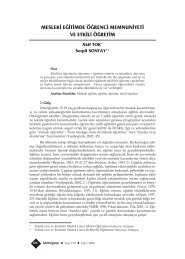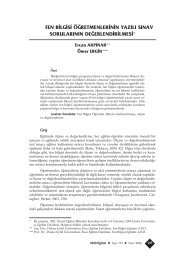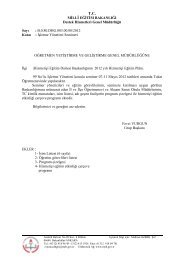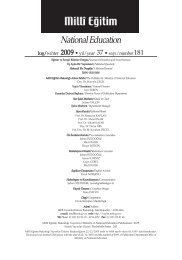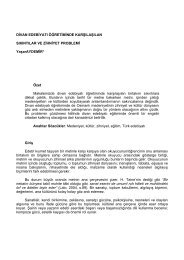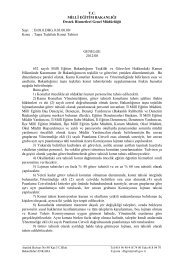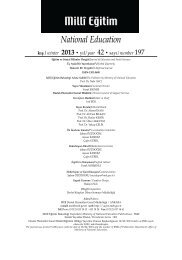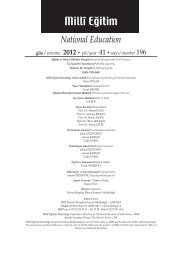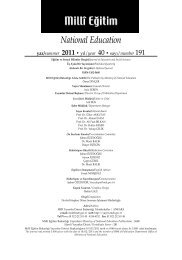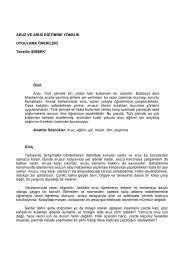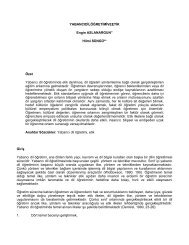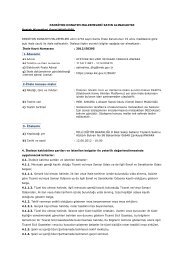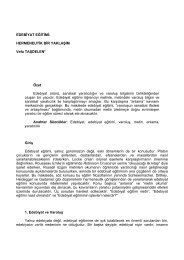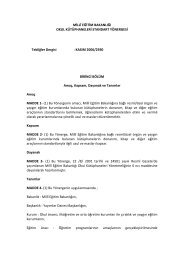- Page 1 and 2:
National Education kış/winter 201
- Page 3 and 4:
Edi tör’den … Değerli okurlar
- Page 5 and 6:
‹çindekiler / Table of Contents
- Page 7 and 8:
Okulöncesi Öğretmenlerinin Fen E
- Page 9 and 10:
u H. Ömer Beydoğan ninde düzenle
- Page 11 and 12:
u H. Ömer Beydoğan 2. Yazılı ve
- Page 13 and 14:
u H. Ömer Beydoğan mada temel bec
- Page 15 and 16:
u H. Ömer Beydoğan Yazılı Özet
- Page 17 and 18:
u H. Ömer Beydoğan süreçlerine
- Page 19 and 20:
u H. Ömer Beydoğan Kaynakça Alex
- Page 21 and 22:
u H. Ömer Beydoğan STRATEGIES EFF
- Page 23 and 24:
u Cevdet Epçaçan / Melih Erzen la
- Page 25 and 26:
u Cevdet Epçaçan / Melih Erzen
- Page 27 and 28:
u Cevdet Epçaçan / Melih Erzen de
- Page 29 and 30:
u Cevdet Epçaçan / Melih Erzen S2
- Page 31 and 32:
u Cevdet Epçaçan / Melih Erzen OK
- Page 33 and 34:
YENİ TÜRKÇE DERSİ ÖĞRETİM PR
- Page 35 and 36:
u Fatma Susar Kırmızı / Nevin Ak
- Page 37 and 38:
u Fatma Susar Kırmızı / Nevin Ak
- Page 39 and 40:
u Fatma Susar Kırmızı / Nevin Ak
- Page 41 and 42:
u Fatma Susar Kırmızı / Nevin Ak
- Page 43 and 44:
u Fatma Susar Kırmızı / Nevin Ak
- Page 45 and 46:
u Fatma Susar Kırmızı / Nevin Ak
- Page 47 and 48:
u Fatma Susar Kırmızı / Nevin Ak
- Page 49 and 50:
u Ayfer Şahin öğrencilere büyü
- Page 51 and 52:
u Ayfer Şahin Çeçen ve Çiftçi
- Page 53 and 54:
u Ayfer Şahin Tablo 1. Araştırma
- Page 55 and 56:
u Ayfer Şahin Tablo 6. Öğretmenl
- Page 57 and 58:
u Ayfer Şahin Tablo 7 incelendiği
- Page 59 and 60:
u Ayfer Şahin Konular, öğrencini
- Page 61 and 62:
u Ayfer Şahin Öğretmenlerin, ö
- Page 63 and 64:
u Ayfer Şahin sonlarına gelen kel
- Page 65 and 66:
u Ayfer Şahin EVALUATION OF PRIMAR
- Page 67 and 68:
u Talat Aytan Bir “ifade ve becer
- Page 69 and 70:
u Talat Aytan Pamukkale, Türkiye
- Page 71 and 72:
u Talat Aytan ÖRNEK: Bana göre, T
- Page 73 and 74:
ó Gelişme paragrafları birer cü
- Page 75 and 76:
ó Her gelişme paragrafı bir cüm
- Page 77 and 78:
u Talat Aytan Örnek Kompozisyon: P
- Page 79 and 80:
u Talat Aytan günlerde de eşime g
- Page 81 and 82:
YABANCI DİL ÖĞRETMEN YETİŞTİR
- Page 83 and 84:
u İrem Kızılaslan açıklığı
- Page 85 and 86:
u İrem Kızılaslan Örnek 3: Oslo
- Page 87 and 88:
u İrem Kızılaslan bilecek en de
- Page 89 and 90:
u İrem Kızılaslan INTERCULTURALI
- Page 91 and 92:
u Hidayet Tok Öğrencilerin İngil
- Page 93 and 94:
u Hidayet Tok ları olan öğrencil
- Page 95 and 96:
u Hidayet Tok Bölüm I Tablo1 Ara
- Page 97 and 98:
u Hidayet Tok Tablo 7 Annenin Eğit
- Page 99 and 100:
u Hidayet Tok olumlu düzeyde oldu
- Page 101 and 102:
u Hidayet Tok Tablo 17 Annenin Eği
- Page 103 and 104:
u Hidayet Tok Tablo 22 ve 23 babala
- Page 105 and 106:
u Hidayet Tok Kağıtçıbaşı, Ç
- Page 107 and 108:
MİLLÎ EĞİTİM BAKANLIĞINDA GÖ
- Page 109 and 110:
u Cemal Karaata yon programlarında
- Page 111 and 112:
u Cemal Karaata kez teşkilatı tar
- Page 113 and 114:
u Cemal Karaata Anket uygulanan ö
- Page 115 and 116:
u Cemal Karaata Tablo 8. İngilizce
- Page 117 and 118:
u Cemal Karaata İstanbul gibi Tür
- Page 119 and 120:
u Cemal Karaata Tablo 19. Haftada O
- Page 121 and 122:
u Cemal Karaata Çapraz Değerlendi
- Page 123 and 124:
Sonuçlar ve Tartışma Resmi ilk v
- Page 125 and 126:
u Cemal Karaata Önerilen bu modeld
- Page 127 and 128:
7- HİE faaliyetleri düzenlenirken
- Page 129 and 130:
u Cemal Karaata SUGGESTIONS FOR THE
- Page 131 and 132:
u Halük Ünsal Genel olarak bakıl
- Page 133 and 134:
u Halük Ünsal 1 2 3 Öğrenme Etk
- Page 135 and 136:
u Halük Ünsal Kişisel hızda far
- Page 137 and 138:
u Halük Ünsal A NEW LEARNING APPR
- Page 139 and 140:
u Neşe Döne Akkurt Bilgi çağın
- Page 141 and 142:
u Neşe Döne Akkurt • Gruplar ar
- Page 143 and 144:
u Neşe Döne Akkurt Araştırma so
- Page 145 and 146:
u Neşe Döne Akkurt Kaynakça AÇI
- Page 147 and 148:
u Neşe Döne Akkurt THE EFFECT OF
- Page 149 and 150:
u Selçuk Uygun “M. Emin Soysal
- Page 151 and 152:
u Selçuk Uygun olumsuz bir kişili
- Page 153 and 154:
u Selçuk Uygun Soysal’ın İzmir
- Page 155 and 156:
u Selçuk Uygun Soysal’a (1942: 4
- Page 157 and 158:
u Selçuk Uygun leri ile ilgili yen
- Page 159 and 160:
u Selçuk Uygun Bu tartışmalarda
- Page 161 and 162:
u Selçuk Uygun THE LIFE OF M. EMİ
- Page 163 and 164:
u Canan Çetinkanat / Mesut Sağnak
- Page 165 and 166:
u Canan Çetinkanat / Mesut Sağnak
- Page 167 and 168:
u Canan Çetinkanat / Mesut Sağnak
- Page 169 and 170:
u Canan Çetinkanat / Mesut Sağnak
- Page 171 and 172:
u Canan Çetinkanat / Mesut Sağnak
- Page 173 and 174:
u Canan Çetinkanat / Mesut Sağnak
- Page 175 and 176:
SINIF ÖĞRETMENLERİNİN İLKÖĞR
- Page 177 and 178:
u Çavuş Şahin / Ersin Ersoy oldu
- Page 179 and 180:
u Çavuş Şahin / Ersin Ersoy Ara
- Page 181 and 182:
u Çavuş Şahin / Ersin Ersoy Tabl
- Page 183 and 184:
u Çavuş Şahin / Ersin Ersoy Tabl
- Page 185 and 186:
u Çavuş Şahin / Ersin Ersoy Tabl
- Page 187 and 188:
u Çavuş Şahin / Ersin Ersoy Tabl
- Page 189 and 190:
u Çavuş Şahin / Ersin Ersoy sı
- Page 191 and 192:
u Çavuş Şahin / Ersin Ersoy Kayn
- Page 193 and 194:
SU DALGALARI KONUSUNUN ÖĞRETİMİ
- Page 195 and 196:
u Yalçın Yalçın / Nevzat Kavcar
- Page 197 and 198:
u Yalçın Yalçın / Nevzat Kavcar
- Page 199 and 200:
u Yalçın Yalçın / Nevzat Kavcar
- Page 201 and 202:
u Yalçın Yalçın / Nevzat Kavcar
- Page 203 and 204:
u Yalçın Yalçın / Nevzat Kavcar
- Page 205 and 206:
u Yalçın Yalçın / Nevzat Kavcar
- Page 207 and 208:
u Yalçın Yalçın / Nevzat Kavcar
- Page 209 and 210:
u Yalçın Yalçın / Nevzat Kavcar
- Page 211 and 212:
u Yalçın Yalçın / Nevzat Kavcar
- Page 213 and 214: u Yalçın Yalçın / Nevzat Kavcar
- Page 215 and 216: u Yalçın Yalçın / Nevzat Kavcar
- Page 217 and 218: u Yalçın Yalçın / Nevzat Kavcar
- Page 219 and 220: u Yalçın Yalçın / Nevzat Kavcar
- Page 221 and 222: u Yalçın Yalçın / Nevzat Kavcar
- Page 223 and 224: u Yalçın Yalçın / Nevzat Kavcar
- Page 225 and 226: u Yalçın Yalçın / Nevzat Kavcar
- Page 227 and 228: FEN VE TEKNOLOJİ DERSİ KILAVUZ K
- Page 229 and 230: u Kader B. Konur / Alipaşa Ayas /
- Page 231 and 232: u Kader B. Konur / Alipaşa Ayas /
- Page 233 and 234: u Kader B. Konur / Alipaşa Ayas /
- Page 235 and 236: u Kader B. Konur / Alipaşa Ayas /
- Page 237 and 238: u Kader B. Konur / Alipaşa Ayas /
- Page 239 and 240: u Kader B. Konur / Alipaşa Ayas /
- Page 241 and 242: u Nilüfer Cerit Berber / Musa Sar
- Page 243 and 244: u Nilüfer Cerit Berber / Musa Sar
- Page 245 and 246: u Nilüfer Cerit Berber / Musa Sar
- Page 247 and 248: u Nilüfer Cerit Berber / Musa Sar
- Page 249 and 250: u Nilüfer Cerit Berber / Musa Sar
- Page 251 and 252: u Nilüfer Cerit Berber / Musa Sar
- Page 253 and 254: u Nilüfer Cerit Berber / Musa Sar
- Page 255 and 256: u Nilüfer Cerit Berber / Musa Sar
- Page 257 and 258: u Nilüfer Cerit Berber / Musa Sar
- Page 259 and 260: u Nilüfer Cerit Berber / Musa Sar
- Page 261 and 262: u Nilüfer Cerit Berber / Musa Sar
- Page 263: u Nilüfer Cerit Berber / Musa Sar
- Page 267 and 268: u Saide Özbey / Fatma Alisinanoğl
- Page 269 and 270: u Saide Özbey / Fatma Alisinanoğl
- Page 271 and 272: u Saide Özbey / Fatma Alisinanoğl
- Page 273 and 274: u Saide Özbey / Fatma Alisinanoğl
- Page 275 and 276: u Saide Özbey / Fatma Alisinanoğl
- Page 277 and 278: u Saide Özbey / Fatma Alisinanoğl
- Page 279 and 280: u S. Nihat Şad / Sabahattin Arıba
- Page 281 and 282: u S. Nihat Şad / Sabahattin Arıba
- Page 283 and 284: u S. Nihat Şad / Sabahattin Arıba
- Page 285 and 286: u S. Nihat Şad / Sabahattin Arıba
- Page 287 and 288: u S. Nihat Şad / Sabahattin Arıba
- Page 289 and 290: u S. Nihat Şad / Sabahattin Arıba
- Page 291 and 292: u S. Nihat Şad / Sabahattin Arıba
- Page 293 and 294: u S. Nihat Şad / Sabahattin Arıba
- Page 295 and 296: u S. Nihat Şad / Sabahattin Arıba
- Page 297 and 298: u S. Nihat Şad / Sabahattin Arıba
- Page 299 and 300: u S. Nihat Şad / Sabahattin Arıba
- Page 301 and 302: u Kadir Ulusoy okullarda uygulayaca
- Page 303 and 304: u Kadir Ulusoy ramının öğrencil
- Page 305 and 306: u Kadir Ulusoy öğrencilerin anlam
- Page 307 and 308: u Kadir Ulusoy tutan anlam çözüm
- Page 309 and 310: u Kadir Ulusoy “Laikliğin faydas
- Page 311 and 312: u Kadir Ulusoy Kısacası; öğretm
- Page 313 and 314: u Kadir Ulusoy PRESERVICE SOCIAL SC
- Page 315 and 316:
u Mutlu Uygur / Tuğba Yanpar Yelke
- Page 317 and 318:
u Mutlu Uygur / Tuğba Yanpar Yelke
- Page 319 and 320:
3. Deney grubunun ön test başarı
- Page 321 and 322:
u Mutlu Uygur / Tuğba Yanpar Yelke
- Page 323 and 324:
u Mutlu Uygur / Tuğba Yanpar Yelke
- Page 325 and 326:
u Mutlu Uygur / Tuğba Yanpar Yelke
- Page 327 and 328:
u Mutlu Uygur / Tuğba Yanpar Yelke
- Page 329 and 330:
insanın kendini ifade etmesi, Guli
- Page 331 and 332:
u Işıkhan Uğurel / Sevgi Moralı
- Page 333 and 334:
u Işıkhan Uğurel / Sevgi Moralı
- Page 335 and 336:
u Işıkhan Uğurel / Sevgi Moralı
- Page 337 and 338:
u Işıkhan Uğurel / Sevgi Moralı
- Page 339 and 340:
u Işıkhan Uğurel / Sevgi Moralı
- Page 341 and 342:
u Işıkhan Uğurel / Sevgi Moralı
- Page 343 and 344:
u Işıkhan Uğurel / Sevgi Moralı
- Page 345 and 346:
u Işıkhan Uğurel / Sevgi Moralı
- Page 347 and 348:
İki grubun düşünceleri arasınd
- Page 349 and 350:
u Işıkhan Uğurel / Sevgi Moralı
- Page 351 and 352:
u Işıkhan Uğurel / Sevgi Moralı
- Page 353 and 354:
MÜZİK ÖĞRETMENLERİNİN YENİ
- Page 355 and 356:
u Zeki Nacakcı edilmiştir. Hazır
- Page 357 and 358:
u Zeki Nacakcı 28,6’ sı kısmen
- Page 359 and 360:
1.“İlköğretim müzik derslerin
- Page 361 and 362:
u Zeki Nacakcı rini belirtmişlerd
- Page 363 and 364:
u Zeki Nacakcı Programın uygulanm
- Page 365 and 366:
BİR TOPLUMSAL DEĞİŞME PARADİGM
- Page 367 and 368:
u Abdulvahap Özpolat Eğitim ve To
- Page 369 and 370:
u Abdulvahap Özpolat Türkiye’de
- Page 371 and 372:
u Abdulvahap Özpolat teorik bağla
- Page 373 and 374:
u Abdulvahap Özpolat yanında, top
- Page 375 and 376:
u Abdulvahap Özpolat temel doğrul
- Page 377 and 378:
u Abdulvahap Özpolat luyla bir diz
- Page 379 and 380:
u Abdulvahap Özpolat ramlarla ifad
- Page 381 and 382:
u Abdulvahap Özpolat THE REFLECTIO
- Page 383 and 384:
Yayın Kurulu'nca, yayımlanan yaz
- Page 385 and 386:
Birden çok kaynak söz konusuysa,
- Page 387 and 388:
PUBLICATION PRINCIPLES OF THE JOURN
- Page 389 and 390:
Main titles: abstract, main text se
- Page 391:
g) The remaining citing should meet



